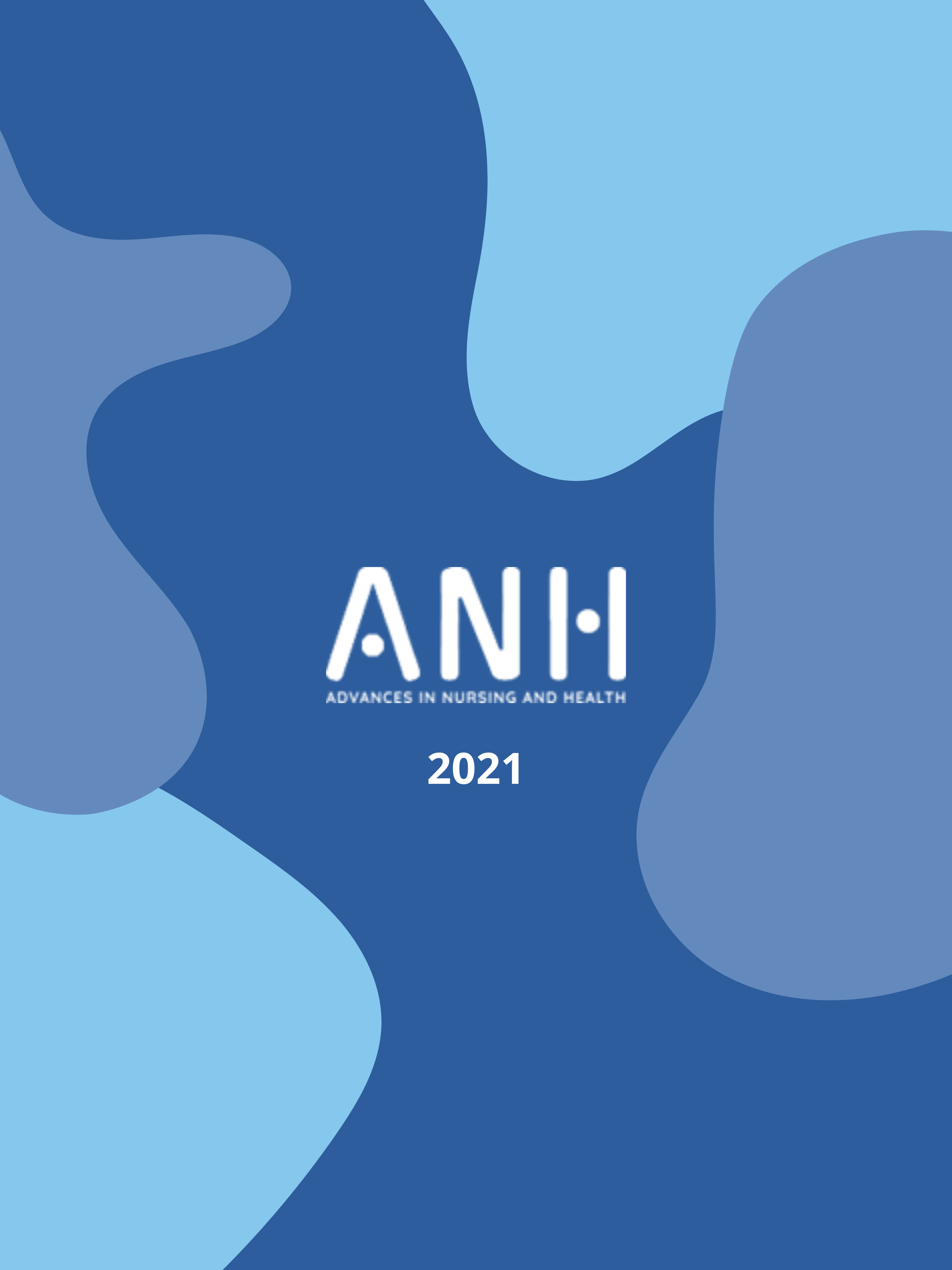Impact of Brief Intervention performed by nursing on psychoactive substance consumption
DOI:
https://doi.org/10.5433/anh.2021v3.id42532Keywords:
Substance-Related Disorders, Brief Psychotherapy, Psychiatric Nursing, Psychiatric RehabilitationAbstract
Objective: to assess the impact of the Brief Intervention (BI) performed by nursing with patients who consumed psychoactive substances.
Method: this is a descriptive, quasi-experimental study, with intragroup design, carried out with 34 users of psychoactive substances in an extra-hospital mental healthcare service in Paraná-PR, in the period from 2018 to 2019. The instruments used for data collection were the Alcohol, Smoking and Substance Involvement Screening Test (ASSIST) and the Life Orientation Test (TOV-R).
Results: the total study population was 34, consisting of 24 men (61.5%) and 10 women (25.6%), aged between 18 and 64 years. The result of the paired t-test calculation indicated that there is statistical significance when compared to initial and final means of psychoactive substance consumption. That is, at the time of the first contact with the patient and at the end of their follow-up, there is a difference in the mean scores, meaning that there was a significant decrease in psychoactive substance consumption.
Conclusion: the proposed practices resulted in a medium impact for reduction in psychoactive substance consumption. It is noteworthy that mental healthcare nurses have shown to significantly contribute to the reduction of psychoactive substance consumption through BI application.
Downloads
References
Bandeira M, Bekou V, Lott KS, Teixeira MA, Rocha SS. Validação transcultural do teste de orientação da vida (LOT-R). Estud Psicol. 2002; 7(2):251-8.
Carvalho AF, Connor JP, Haber PS, Hall WD. Alcohol use disorders. Lancet. 2019; 394 (10200):781-792.
Cunha SM, Carvalho JCN, Kolling MN, Silva CRDA, Kristensen CH. Social skills in alcoholics: an exploratory study. Rev bras ter cogn. 2007; 3(1): 31-9.
Foulds JA, Adamson SJ, Boden JM, Williman JA, Mulder RT. Depression in patients with alcohol use disorders: systematic review and meta-analysis of outcomes for independent and substance-induced disorders. J Affect Disord. 2015; (185):47-59.
Glass JE, Hamilton AM, Powell BJ, Perron BE, Brown RT, Ilgen MA. Specialty substance use disorder services following brief alcohol intervention: a meta-analysis of randomized controlled trials. Addict. 2015; 110(9): 1404-15.
Humeniuk R, Newcombe DAL, Dennington V, Ali R. A randomised controlled trial of a brief intervention for illicit drug use linked to ASSIST screening in a primary healthcare setting: results from the Australian componente of the World Health Organization Phase III ASSIST studies. Aust J Prim Health. 2018; 24(2):149-54.
Humeniuk, R.; Dennington, V.; Ali, R.L. The effectiveness of a brief intervention for illicit drugs linked to the ASSIST screening test in primary health care settings: a technical report of phase III findings of the WHO ASSIST randomised controlled trial. Genebra; 2008.
Junior IJF, Calheiro PRV, Crispim PTB. Motivation for Change in Substances Use among Drug Users Referred by the Justice System. Trends in Psychology. 2018; 26(3), 1363-1378.
Kaner EFS, Beyer F, Dickinson HO, Pienaar E, Campbell F, Schlesinger C, et al. Effectiveness of brief alcohol interventions in primary care populations (review). Cochrane Database Syst Rev. 2018; (2).
Kucmin T, Kucmin A, Turska D, Turski A, Nogalski A. Coping styles and dispositional optimism as predcitors of post-traumatic stress disorder (PTSD) symptoms intensity in paramedics. Psychiatr Pol. 2018; 52(3): 557-71.
O'donnell A, Anderson P, Newbury-Birch D, Schulte B, Schmidt C, Reimer J, Kaner E. The impact of brief alcohol interventions in primary healthcare: a systematic review of reviews. Alcohol alcohol. 2014; 49 (1): 66-78.
Pereira MO, Anginoni BM, Ferreira N, Oliveira MAF, Vargas D, Colvero LA. Efetividade da intervenção breve para o uso abusivo de álcool na atenção primária: revisão sistemática. Rev bras enferm.2013; 66 (3): 420-428.
Platt L, Melendez-Torres GF, O'Donnell A, Bradley J, Newbury-Birch D, Kane E, et al. How effective are brief interventions in reducing alcohol comsuption: do the setting practitioner group and content matter? Findinds from a systematic review and metagression analysis. BMJ Open. 2016; 6(8).
Santos MC; Wechsler SM. Análise das publicações científicas sobre otimismo em saúde no último triênio. Psicologia Argumento. 2015. 33(83), 470-482.
Schmidt CS, Schulte B, Seo HN, Kuhn S, O'Donnell A, Kriston L, et al. Meta-analysis on the effectiveness of alcohol screening with brief interventions for patients in emergency care settings. Addict. 2016 11(5).
Shepard DS, Lwin AK, Barnett NP, Mastroleo N, Colby SM, Gwaltney C, Monti PM. Cost-effectiveness of motivational intervention with significant others for patients with alcohol misuse. Addict. 2016; 111 (5): 832-839.
Soares J, Vargas D. Effectiveness of brief group intervention in the harmful alcohol use in primary health care. Rev Saude Públ. 2019; 53(2):1-10.
Soares MH, Rolin TFC, Machado FP, Ramos LKF, Rampazzo ARP. Impact of brief intervention. and art therapy for alcohol users. Rev. Bras. Enferm. 2019; 72(6):1485-1489.
Sobell LC, Sobell MB. Terapia de grupo para transtornos por abuso de substâncias: abordagem cognitiva-comportamental motivacional. Porto Alegre: Artmed; 2013.
Vipond J, Menenga HA. Screening, brief intervention and referral to treatment by emergency nurses: a review of the literature. J Emer Nurs. 2019; 45(2): 178-84.
World Health Organazation (WHO). Global status report on alcohol and health. Canadá 1990-2006. Geneva; 2011.
Downloads
Published
How to Cite
Issue
Section
License
Copyright (c) 2022 Advances in Nursing and Health

This work is licensed under a Creative Commons Attribution 4.0 International License.
All or the content of the newspaper is licensed under a Creative Commons Attribution License, of the CC-BY attribution type.
Authors retain the copyright, articles published in Advances in Nursing and Health are licensed under the Creative Commons Attribution 4.0 International License, which ensures Open Access. This license allows any user to read, download, copy, and share the content, as long as it is properly cited. It also permits the reuse of the material, including its distribution, adaptation, and creation of derivative works in any format or medium, provided appropriate credit is given, a link to the license is provided, and any changes made are indicated. In addition, the license allows commercial use of the content.



















